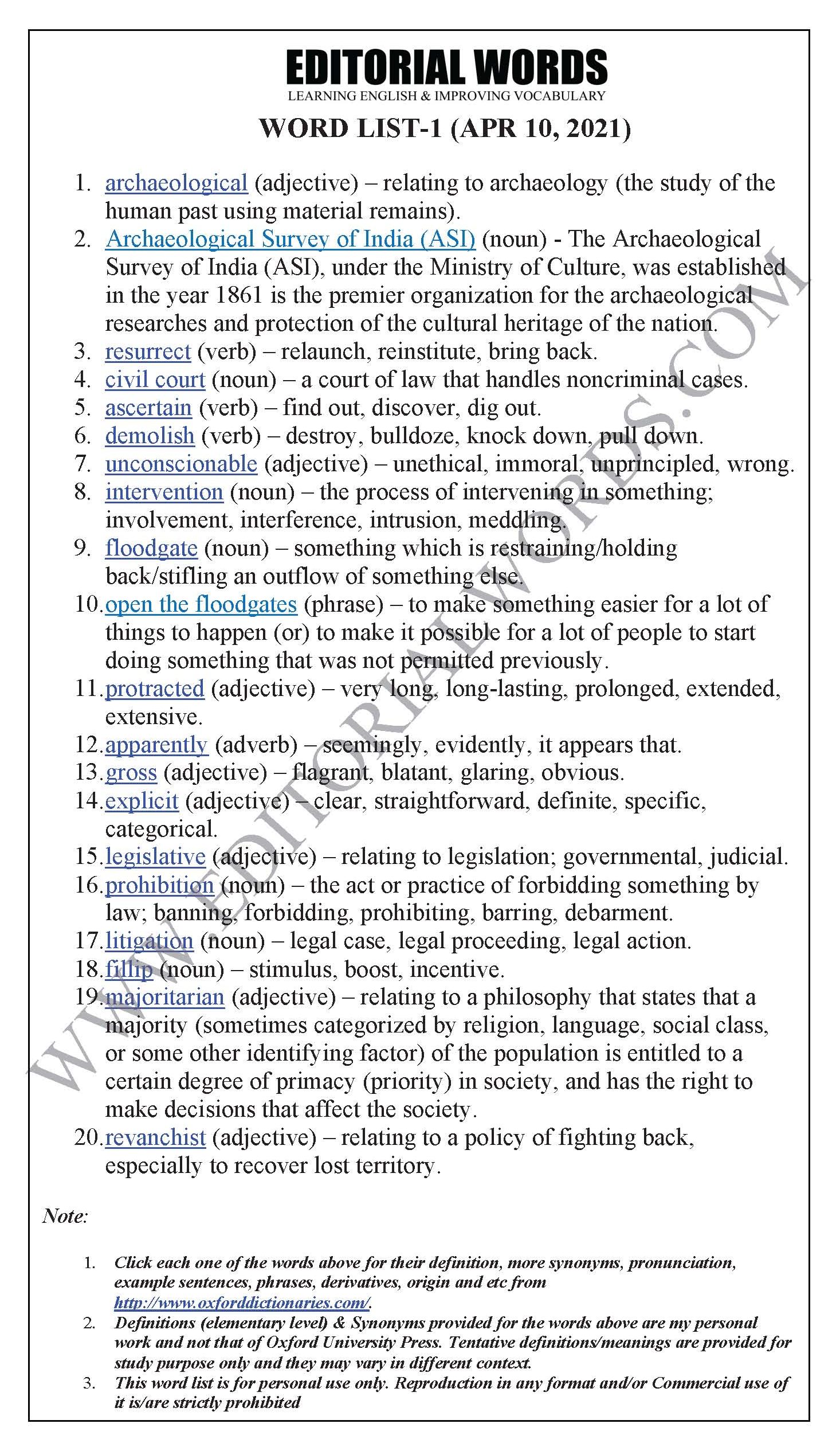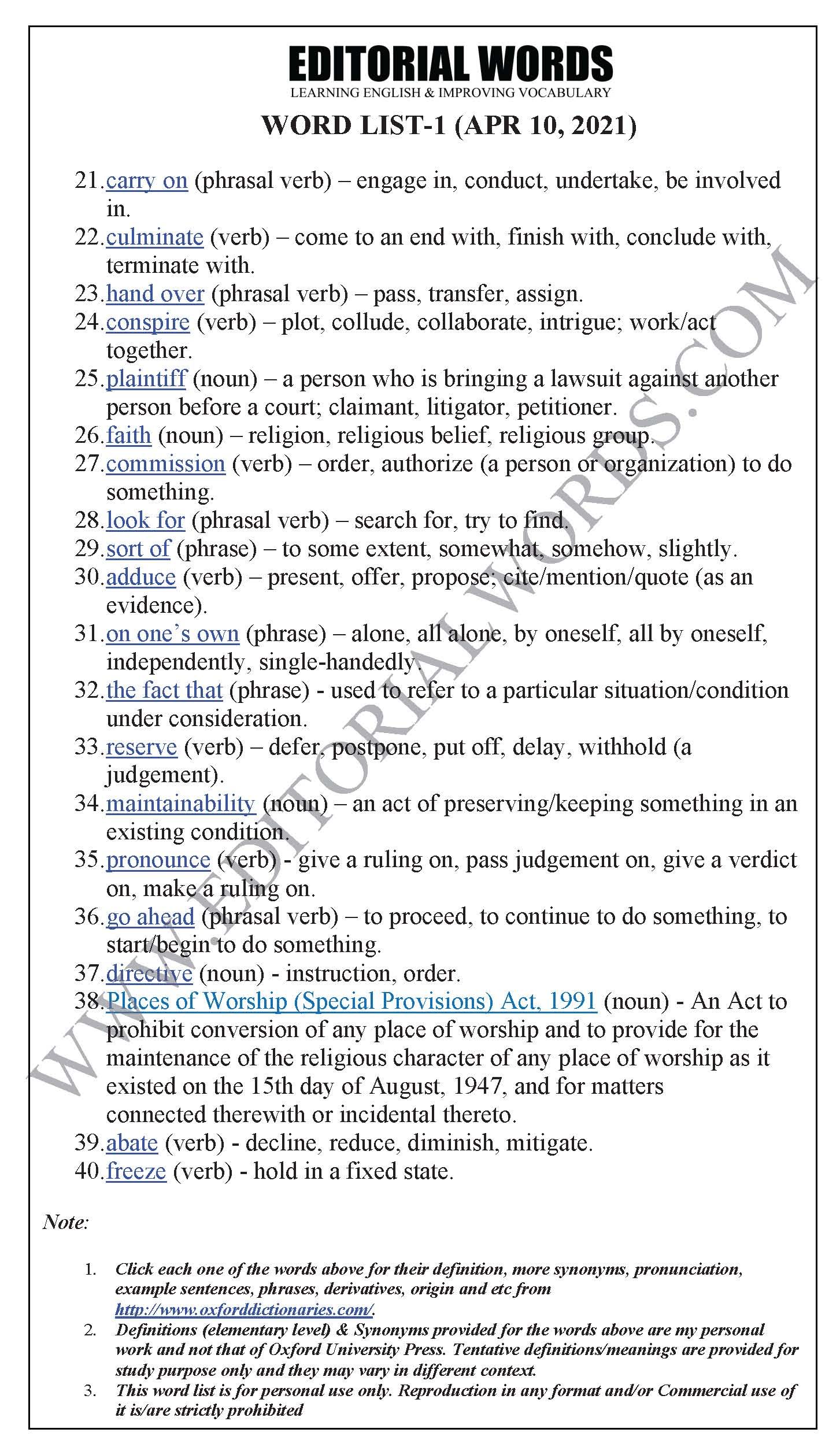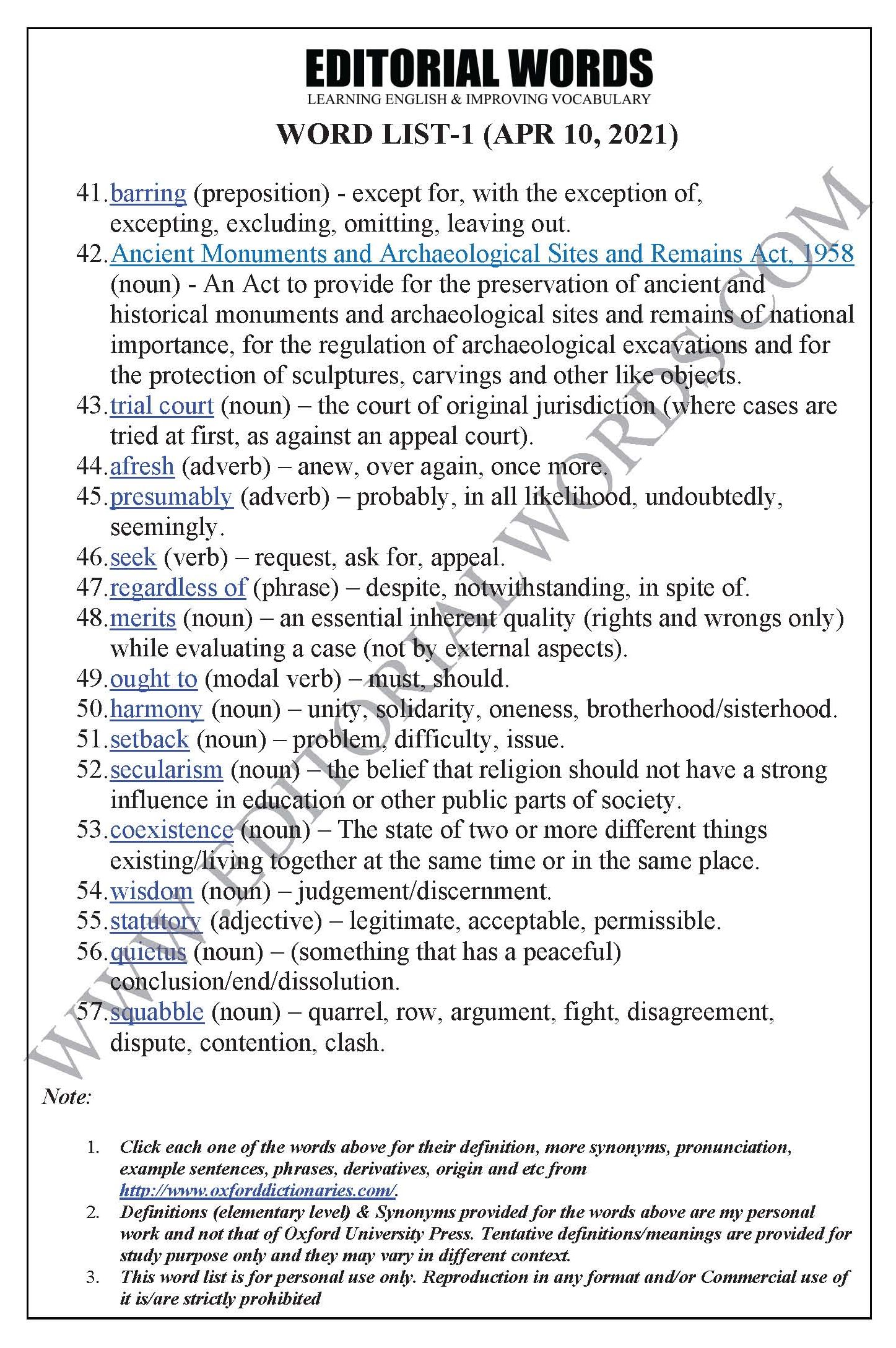The Hindu Editorial (A disturbing order) – Apr 10, 2021
The order of a civil court in Varanasi that the Archaeological Survey of India (ASI) should conduct a survey to ascertain whether the Gyanvapi mosque was built over a demolished Hindu temple…. For further reading, visit “The Hindu”. Below is today’s word list-1 for The Hindu Editorial (A disturbing order) – Apr 10, 2021.
To read this article, click here.
This preview is provided here with permission.
Courtesy: The Hindu
The Hindu Editorial (A disturbing order) – Apr 10, 2021:
- archaeological (adjective) – relating to archaeology (the study of the human past using material remains).
- Archaeological Survey of India (ASI) (noun) – The Archaeological Survey of India (ASI), under the Ministry of Culture, was established in the year 1861 is the premier organization for the archaeological researches and protection of the cultural heritage of the nation.
- resurrect (verb) – relaunch, reinstitute, bring back.
- civil court (noun) – a court of law that handles noncriminal cases.
- ascertain (verb) – find out, discover, dig out.
- demolish (verb) – destroy, bulldoze, knock down, pull down.
- unconscionable (adjective) – unethical, immoral, unprincipled, wrong.
- intervention (noun) – the process of intervening in something; involvement, interference, intrusion, meddling.
- floodgate (noun) – something which is restraining/holding back/stifling an outflow of something else.
- open the floodgates (phrase) – to make something easier for a lot of things to happen (or) to make it possible for a lot of people to start doing something that was not permitted previously.
- protracted (adjective) – very long, long-lasting, prolonged, extended, extensive.
- apparently (adverb) – seemingly, evidently, it appears that.
- gross (adjective) – flagrant, blatant, glaring, obvious.
- explicit (adjective) – clear, straightforward, definite, specific, categorical.
- legislative (adjective) – relating to legislation; governmental, judicial.
- prohibition (noun) – the act or practice of forbidding something by law; banning, forbidding, prohibiting, barring, debarment.
- litigation (noun) – legal case, legal proceeding, legal action.
- fillip (noun) – stimulus, boost, incentive.
- majoritarian (adjective) – relating to a philosophy that states that a majority (sometimes categorized by religion, language, social class, or some other identifying factor) of the population is entitled to a certain degree of primacy (priority) in society, and has the right to make decisions that affect the society.
- revanchist (adjective) – relating to a policy of fighting back, especially to recover lost territory.
- carry on (phrasal verb) – engage in, conduct, undertake, be involved in.
- culminate (verb) – come to an end with, finish with, conclude with, terminate with.
- hand over (phrasal verb) – pass, transfer, assign.
- conspire (verb) – plot, collude, collaborate, intrigue; work/act together.
- plaintiff (noun) – a person who is bringing a lawsuit against another person before a court; claimant, litigator, petitioner.
- faith (noun) – religion, religious belief, religious group.
- commission (verb) – order, authorize (a person or organization) to do something.
- look for (phrasal verb) – search for, try to find.
- sort of (phrase) – to some extent, somewhat, somehow, slightly.
- adduce (verb) – present, offer, propose; cite/mention/quote (as an evidence).
- on one’s own (phrase) – alone, all alone, by oneself, all by oneself, independently, single-handedly.
- the fact that (phrase) – used to refer to a particular situation/condition under consideration.
- reserve (verb) – defer, postpone, put off, delay, withhold (a judgement).
- maintainability (noun) – an act of preserving/keeping something in an existing condition.
- pronounce (verb) – give a ruling on, pass judgement on, give a verdict on, make a ruling on.
- go ahead (phrasal verb) – to proceed, to continue to do something, to start/begin to do something.
- directive (noun) – instruction, order.
- Places of Worship (Special Provisions) Act, 1991 (noun) – An Act to prohibit conversion of any place of worship and to provide for the maintenance of the religious character of any place of worship as it existed on the 15th day of August, 1947, and for matters
connected therewith or incidental thereto. - abate (verb) – decline, reduce, diminish, mitigate.
- freeze (verb) – hold in a fixed state.
- barring (preposition) – except for, with the exception of, excepting, excluding, omitting, leaving out.
- Ancient Monuments and Archaeological Sites and Remains Act, 1958 (noun) – An Act to provide for the preservation of ancient and historical monuments and archaeological sites and remains of national importance, for the regulation of archaeological excavations and for the protection of sculptures, carvings and other like objects.
- trial court (noun) – the court of original jurisdiction (where cases are tried at first, as against an appeal court).
- afresh (adverb) – anew, over again, once more.
- presumably (adverb) – probably, in all likelihood, undoubtedly, seemingly.
- seek (verb) – request, ask for, appeal.
- regardless of (phrase) – despite, notwithstanding, in spite of.
- merits (noun) – an essential inherent quality (rights and wrongs only) while evaluating a case (not by external aspects).
- ought to (modal verb) – must, should.
- harmony (noun) – unity, solidarity, oneness, brotherhood/sisterhood.
- setback (noun) – problem, difficulty, issue.
- secularism (noun) – the belief that religion should not have a strong influence in education or other public parts of society.
- coexistence (noun) – The state of two or more different things existing/living together at the same time or in the same place.
- wisdom (noun) – judgement/discernment.
- statutory (adjective) – legitimate, acceptable, permissible.
- quietus (noun) – (something that has a peaceful) conclusion/end/dissolution.
- squabble (noun) – quarrel, row, argument, fight, disagreement, dispute, contention, clash.
Note:
1. Click each one of the words above for their definition, more synonyms, pronunciation, example sentences, phrases, derivatives, origin and etc from http://www.oxforddictionaries.com/.
2. Definitions (elementary level) & Synonyms provided for the words above are my personal work and not that of Oxford University Press. Tentative definitions/meanings are provided for study purpose only and they may vary in a different context.
3. This word list is for personal use only. Reproduction in any format and/or Commercial use of it is/are strictly prohibited.
The Hindu Editorial (A disturbing order) – Apr 10, 2021:



“Phrasal Verbs” We Learnt Last Week
“Idioms & Phrases” We Learnt Last Week
“Important Definitions” We Learnt Last Week
Recent Word Lists For The Hindu Editorial Articles

Be the first to comment